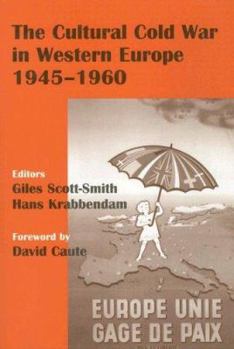The Cultural Cold War in Western Europe, 1945-60
(Part of the Studies in Intelligence Series)
Select Format
Select Condition 
Book Overview
The idea of the Cold War as a propaganda contest as opposed to a military conflict is being increasingly accepted. This has led to a re-evaluation of the relationship between economic policies, political agendas and cultural activities in Western Europe post 1945.
This book provides an important cross-section of case studies that highlight the connections between overt/covert activities and cultural/political agendas during the early Cold War. It therefore provides a valuable bridge between diplomatic and intelligence research and represents an important contribution towards our understanding of the significance and consequences of this linkage for the shaping of post-war democratic societies.Format:Paperback
Language:English
ISBN:0714682713
ISBN13:9780714682716
Release Date:May 2004
Publisher:Routledge
Length:352 Pages
Weight:1.02 lbs.
Dimensions:0.8" x 6.0" x 8.5"
Related Subjects
HistoryCustomer Reviews
0 rating





